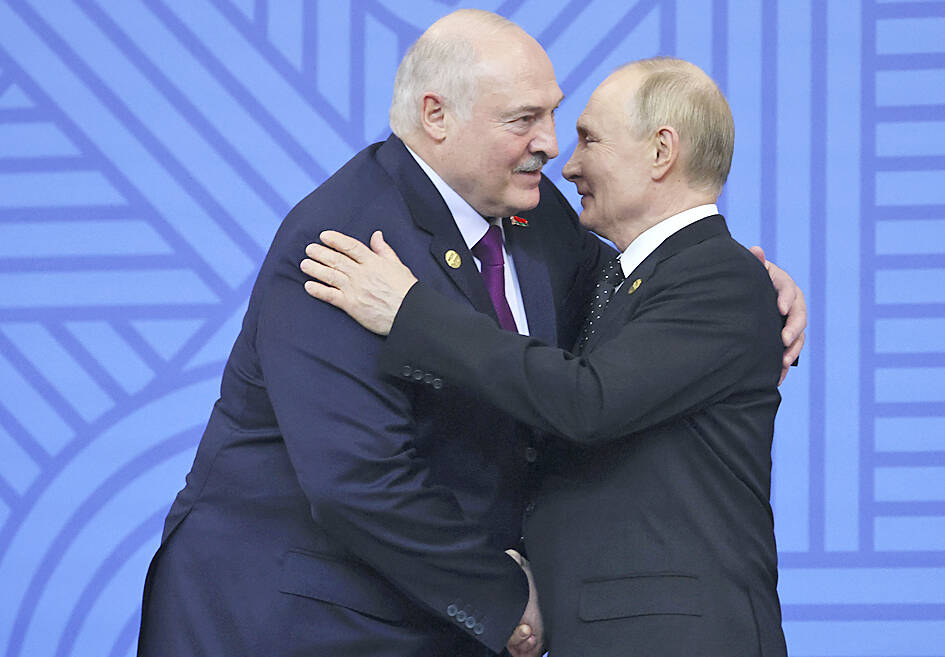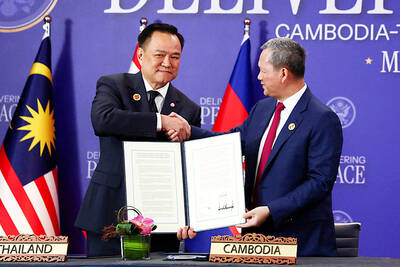Lawmakers in Belarus on Wednesday set the next presidential election for Jan 26, a vote almost certain to extend the three-decade rule of Belarusian President Alexander Lukashenko, who has suppressed all political dissent.
Exiled opposition leader Sviatlana Tsikhanouskaya denounced the upcoming balloting as a “farce.”
Lukashenko has already said he would seek what would be his seventh consecutive term, extending back to 1994, and confirmed it on Wednesday in remarks to Russian state TV. His last victory came in a 2020 election denounced by the opposition and the West as fraudulent.

Photo: EPA-EFE
That prompted an unprecedented wave of mass protests, and his government responded with a violent crackdown, arresting and beating thousands. Opposition leaders have since been jailed or forced to flee the country.
Tsikhanouskaya, who ran against Lukashenko in 2020, urged Belarusians and the world not to recognize the upcoming election amid the continuing political crackdown.
“Lukashenko has set the date for his ‘reelection’ for Jan. 26, but it’s a sham performance without a real electoral process that is taking place in the atmosphere of terror,” Tsikhanouskaya said in a statement. “We urge Belarusians and the international community to reject this farce.”
Viasna, Belarus’ oldest and most prominent human rights organization, said there are about 1,300 political prisoners in Belarus — including leaders of opposition parties and the group’s founder Ales Bialiatski, who won the Nobel Peace Prize in 2022.
Lukashenko in recent months unexpectedly released 115 political prisoners, after the government said they applied for clemency and repented.
Analysts believe he is using the issue of political prisoners to seek Western recognition of the election result and to soften sanctions against his government.
Lukashenko’s current term expires next summer, but election officials said advancing the process to the beginning of the year would allow the president “to exercise his powers at the initial stage of strategic planning.”
However, Belarusian political analyst Valery Karbalevich gave a different reason for scheduling a vote earlier in the year.
“There won’t be mass protests in freezing January,” he said.
Lukashenko would use that fact and his recent release of political prisoners to begin bargaining with the West, he added.
“Lukashenko’s trauma of months-long mass protests still hasn’t healed, and it dictates the model of presidential elections in January with no discussions and no choice,” he added.
Belarusian authorities have not said whether they would invite any international observers to monitor the vote.
Belarus refused to allow monitors from the Organization for Security and Cooperation in Europe to observe this year’s parliamentary election for the first time in decades.
Under the complete control of Lukashenko’s government, voting booths for the first time did not have privacy curtains, and voters were not allowed to take photographs of their ballots, which made it impossible to carry out any independent count.

Shamans in Peru on Monday gathered for an annual New Year’s ritual where they made predictions for the year to come, including illness for US President Donald Trump and the downfall of Venezuelan President Nicolas Maduro. “The United States should prepare itself because Donald Trump will fall seriously ill,” Juan de Dios Garcia proclaimed as he gathered with other shamans on a beach in southern Lima, dressed in traditional Andean ponchos and headdresses, and sprinkling flowers on the sand. The shamans carried large posters of world leaders, over which they crossed swords and burned incense, some of which they stomped on. In this

‘NO COUNTRY BUMPKIN’: The judge rejected arguments that former prime minister Najib Razak was an unwitting victim, saying Najib took steps to protect his position Imprisoned former Malaysian prime minister Najib Razak was yesterday convicted, following a corruption trial tied to multibillion-dollar looting of the 1Malaysia Development Berhad (1MDB) state investment fund. The nation’s high court found Najib, 72, guilty on four counts of abuse of power and 21 charges of money laundering related to more than US$700 million channeled into his personal bank accounts from the 1MDB fund. Najib denied any wrongdoing, and maintained the funds were a political donation from Saudi Arabia and that he had been misled by rogue financiers led by businessman Low Taek Jho. Low, thought to be the scandal’s mastermind, remains

Near the entrance to the Panama Canal, a monument to China’s contributions to the interoceanic waterway was torn down on Saturday night by order of local authorities. The move comes as US President Donald Trump has made threats in the past few months to retake control of the canal, claiming Beijing has too much influence in its operations. In a surprising move that has been criticized by leaders in Panama and China, the mayor’s office of the locality of Arraijan ordered the demolition of the monument built in 2004 to symbolize friendship between the countries. The mayor’s office said in

FIGHTING CONTINUES: Thai military dropped 40 bombs on border areas, Cambodia said, while Bangkok said Phnom Penh launched heavy attacks and damaged homes Cambodia yesterday accused Thailand of intensifying its bombardment of disputed border areas, even as officials from the two countries attend a multi-day meeting aimed at negotiating an end to deadly clashes. The neighbors’ long-standing border conflict reignited this month, shattering an earlier truce and killing more than 40 people, according to official counts. About 1 million people have also been displaced. Cambodian and Thai officials were in their third day of talks at a border checkpoint, with ministers of defense from the two countries scheduled to meet today. However, the Cambodian Ministry of National Defense said Thailand’s military carried out a heavy